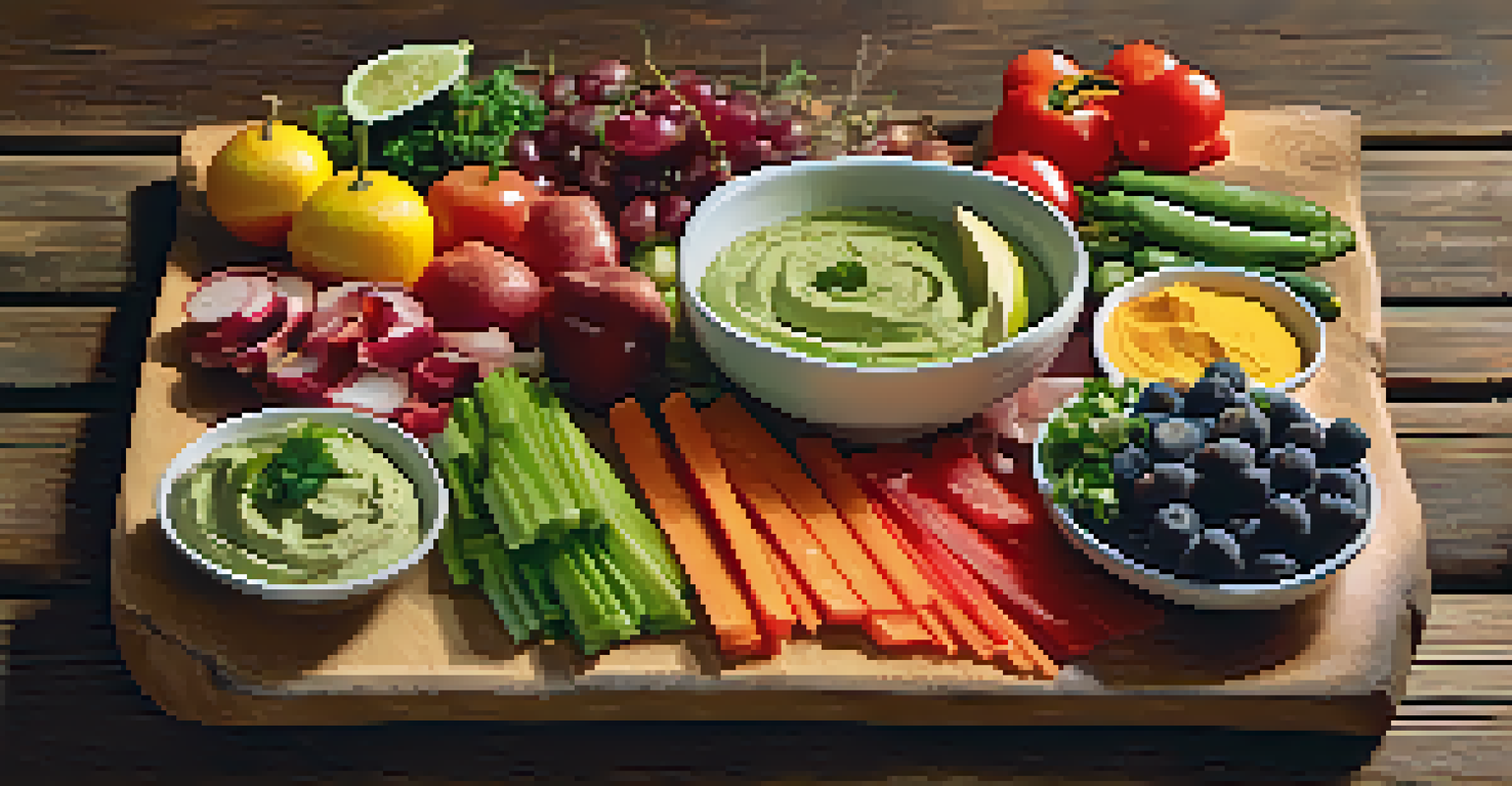Raw Food Diets are the Fastest Way to Lose Weight: Myth or Fact?

Understanding Raw Food Diets and Their Appeal
The raw food diet consists primarily of unprocessed, uncooked foods, often focusing on fruits, vegetables, nuts, and seeds. Many people are drawn to this diet believing it offers a quick fix for weight loss and overall health improvement. The allure lies in the idea that consuming foods in their natural state maximizes their nutritional value, which is a compelling argument for many health-conscious individuals.
Let food be thy medicine and medicine be thy food.
Proponents argue that eating raw can boost energy levels, improve digestion, and enhance skin health. This is partly because raw foods tend to be low in calories yet high in vitamins and minerals. However, while these benefits sound great, the effectiveness of raw food diets for weight loss can vary significantly from person to person.
As with any diet, it's essential to consider personal preferences and lifestyle. Some people thrive on raw foods, while others may feel deprived or struggle to find satisfaction. So, before diving into a raw food regimen, it's crucial to weigh the pros and cons and understand what works best for your body.
The Science Behind Weight Loss and Raw Foods
Weight loss fundamentally relies on creating a calorie deficit, where you consume fewer calories than your body expends. Raw foods are generally lower in calories, which could make it easier to achieve this deficit. However, the key question is whether a raw food diet can sustain long-term weight loss or if it's merely a short-lived trend.

Studies suggest that while some individuals may lose weight quickly on a raw food diet, this can often be attributed to initial changes in water weight or muscle mass rather than fat loss. Additionally, the restrictive nature of raw diets can lead to nutrient deficiencies if not properly managed, which can impact overall health.
Raw Diets: Not a Quick Fix
While raw food diets can lead to initial weight loss, they are not a sustainable or balanced approach for long-term health.
Furthermore, many people may find it challenging to stick with a raw food diet due to cravings for cooked or processed foods. This can lead to a cycle of yo-yo dieting, where any initial weight lost is quickly regained once normal eating habits resume.
Myth or Fact: Quick Weight Loss with Raw Foods
It's a common belief that raw food diets guarantee rapid weight loss; however, this is more myth than fact. While you may see quick results initially, maintaining a healthy weight typically requires a balanced approach to eating. By focusing solely on raw foods, you might overlook other important dietary components, like protein and healthy fats, which are essential for satiety and long-term health.
You are what you eat, so don’t be fast, cheap, easy, or fake.
Real-life anecdotes often tell a different story. Many individuals who have tried raw food diets share that while they lost weight quickly, they struggled to maintain it or faced other health issues. This highlights the importance of a well-rounded diet that includes a variety of food groups.
Ultimately, sustainable weight loss is about finding a diet that you can maintain long-term rather than a quick-fix solution. Raw foods can certainly be a part of a healthy lifestyle, but they shouldn't be seen as the sole answer to weight loss.
Potential Benefits of a Raw Food Diet
Despite the challenges, there are several notable benefits to incorporating raw foods into your diet. Many raw foods are high in fiber, which can aid digestion and keep you feeling full longer. This can be particularly beneficial for those looking to control their appetite while still enjoying their meals.
Raw foods are also packed with antioxidants and enzymes that can promote overall health. These nutrients help combat oxidative stress and may reduce the risk of chronic diseases. Including more raw fruits and vegetables in your diet can certainly enhance your nutrition.
Benefits Include Nutrient Boost
Incorporating raw foods can enhance your diet with fiber, antioxidants, and enzymes that promote overall health.
Additionally, many people report feeling more energized and alert when eating a raw food diet. This boost can lead to increased physical activity, which is another factor contributing to weight loss. However, it's essential to balance these benefits with the potential downsides of restrictive eating.
Challenges of Following a Raw Food Diet
While there are benefits, raw food diets can also come with significant challenges. One of the most notable is the difficulty in meeting all your nutritional needs. Certain vitamins and minerals, such as B12 and iron, are more readily available in cooked foods or animal products, making it harder to achieve a balanced nutrient intake on a strictly raw diet.
Moreover, preparing raw meals can be time-consuming and may require more planning compared to traditional cooking methods. This can be a barrier for those with busy lifestyles or limited cooking skills. The social aspect of eating can also be affected, as dining out or attending gatherings may become tricky when adhering to a raw food diet.
Lastly, cravings for cooked foods can lead to feelings of deprivation and potential binge eating episodes. This highlights the importance of finding a balance that works for you, rather than completely restricting certain food groups.
How to Incorporate Raw Foods Effectively
If you're curious about raw food diets but hesitant to commit fully, consider incorporating more raw foods into your existing meals. You don't have to go 100% raw; even adding more fruits and vegetables to your plate can enhance your diet. Think about blending smoothies with leafy greens or snacking on carrot sticks and hummus instead of chips.
Another approach is to adopt a 'raw till dinner' strategy, where you consume raw foods throughout the day but enjoy a cooked meal in the evening. This allows you to reap the benefits of raw foods while still enjoying the comfort of cooked meals, striking a balance that many find sustainable.
Challenges of Raw Food Adherence
Following a strict raw food diet can lead to nutritional deficiencies and cravings for cooked foods, making it difficult to maintain.
Lastly, experimentation is key. Try different raw recipes, explore new ingredients, and find what you love. The more enjoyable the process, the more likely you are to stick with it and make healthy eating a lasting habit.
Final Thoughts on Raw Food Diets and Weight Loss
In conclusion, while raw food diets can offer some benefits, they are not necessarily the fastest route to weight loss. The idea of quick results can be tempting, but sustainable weight loss comes from a balanced approach that includes a variety of foods. It's crucial to consider your individual needs and preferences when deciding on a diet plan.
Ultimately, successful weight loss is about creating healthy habits that you can maintain long-term, rather than chasing after fleeting trends. If raw foods appeal to you, embrace them as part of a broader, more balanced diet. Listen to your body and find what truly works for you.

The key takeaway here is that there is no one-size-fits-all solution to weight loss. By remaining open to different dietary approaches and focusing on overall wellness, you can achieve your health goals more effectively.